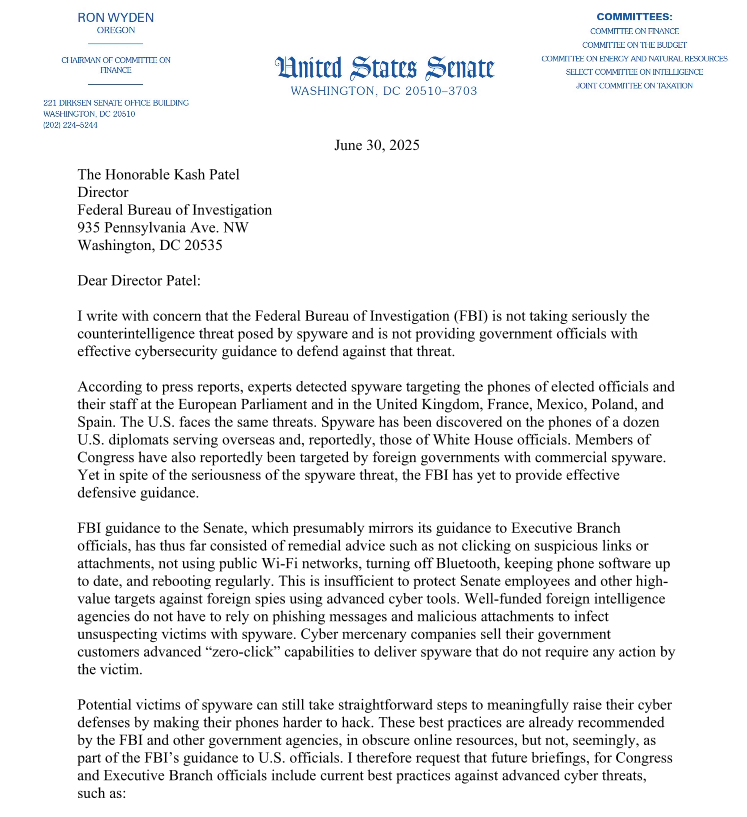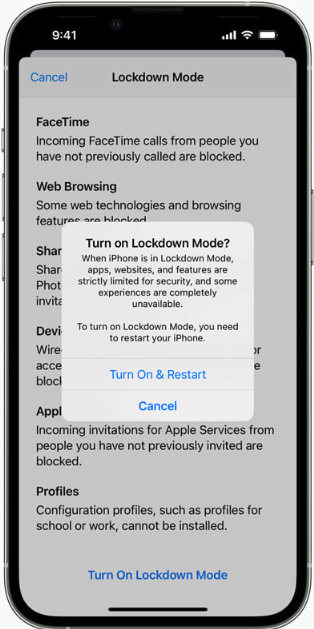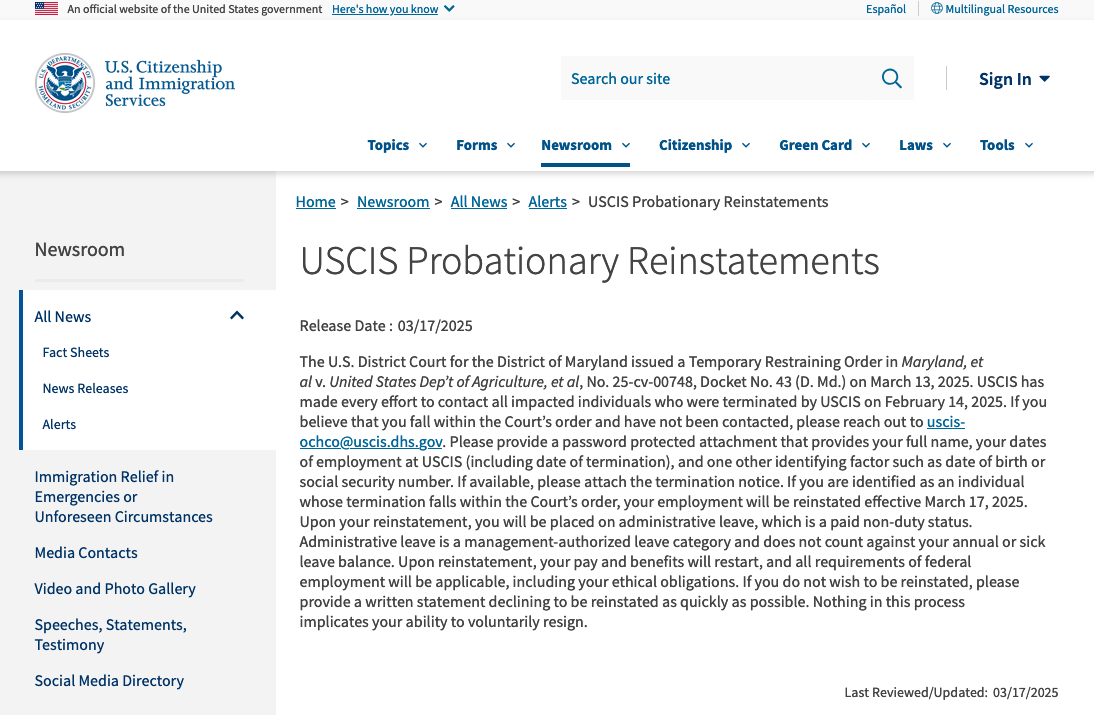Agents with the Federal Bureau of Investigation (FBI) briefed Capitol Hill staff recently on hardening the security of their mobile devices, after a contacts list stolen from the personal phone of the White House Chief of Staff Susie Wiles was reportedly used to fuel a series of text messages and phone calls impersonating her to U.S. lawmakers. But in a letter this week to the FBI, one of the Senate’s most tech-savvy lawmakers says the feds aren’t doing enough to recommend more appropriate security protections that are already built into most consumer mobile devices.

A screenshot of the first page from Sen. Wyden’s letter to FBI Director Kash Patel.
On May 29, The Wall Street Journal reported that federal authorities were investigating a clandestine effort to impersonate Ms. Wiles via text messages and in phone calls that may have used AI to spoof her voice. According to The Journal, Wiles told associates her cellphone contacts were hacked, giving the impersonator access to the private phone numbers of some of the country’s most influential people.
The execution of this phishing and impersonation campaign — whatever its goals may have been — suggested the attackers were financially motivated, and not particularly sophisticated.
“It became clear to some of the lawmakers that the requests were suspicious when the impersonator began asking questions about Trump that Wiles should have known the answers to—and in one case, when the impersonator asked for a cash transfer, some of the people said,” the Journal wrote. “In many cases, the impersonator’s grammar was broken and the messages were more formal than the way Wiles typically communicates, people who have received the messages said. The calls and text messages also didn’t come from Wiles’s phone number.”
Sophisticated or not, the impersonation campaign was soon punctuated by the murder of Minnesota House of Representatives Speaker Emerita Melissa Hortman and her husband, and the shooting of Minnesota State Senator John Hoffman and his wife. So when FBI agents offered in mid-June to brief U.S. Senate staff on mobile threats, more than 140 staffers took them up on that invitation (a remarkably high number considering that no food was offered at the event).
But according to Sen. Ron Wyden (D-Ore.), the advice the FBI provided to Senate staffers was largely limited to remedial tips, such as not clicking on suspicious links or attachments, not using public wifi networks, turning off bluetooth, keeping phone software up to date, and rebooting regularly.
“This is insufficient to protect Senate employees and other high-value targets against foreign spies using advanced cyber tools,” Wyden wrote in a letter sent today to FBI Director Kash Patel. “Well-funded foreign intelligence agencies do not have to rely on phishing messages and malicious attachments to infect unsuspecting victims with spyware. Cyber mercenary companies sell their government customers advanced ‘zero-click’ capabilities to deliver spyware that do not require any action by the victim.”
Wyden stressed that to help counter sophisticated attacks, the FBI should be encouraging lawmakers and their staff to enable anti-spyware defenses that are built into Apple’s iOS and Google’s Android phone software.
These include Apple’s Lockdown Mode, which is designed for users who are worried they may be subject to targeted attacks. Lockdown Mode restricts non-essential iOS features to reduce the device’s overall attack surface. Google Android devices carry a similar feature called Advanced Protection Mode.
Wyden also urged the FBI to update its training to recommend a number of other steps that people can take to make their mobile devices less trackable, including the use of ad blockers to guard against malicious advertisements, disabling ad tracking IDs in mobile devices, and opting out of commercial data brokers (the suspect charged in the Minnesota shootings reportedly used multiple people-search services to find the home addresses of his targets).
The senator’s letter notes that while the FBI has recommended all of the above precautions in various advisories issued over the years, the advice the agency is giving now to the nation’s leaders needs to be more comprehensive, actionable and urgent.
“In spite of the seriousness of the threat, the FBI has yet to provide effective defensive guidance,” Wyden said.
Nicholas Weaver is a researcher with the International Computer Science Institute, a nonprofit in Berkeley, Calif. Weaver said Lockdown Mode or Advanced Protection will mitigate many vulnerabilities, and should be the default setting for all members of Congress and their staff.
“Lawmakers are at exceptional risk and need to be exceptionally protected,” Weaver said. “Their computers should be locked down and well administered, etc. And the same applies to staffers.”
Weaver noted that Apple’s Lockdown Mode has a track record of blocking zero-day attacks on iOS applications; in September 2023, Citizen Lab documented how Lockdown Mode foiled a zero-click flaw capable of installing spyware on iOS devices without any interaction from the victim.

Earlier this month, Citizen Lab researchers documented a zero-click attack used to infect the iOS devices of two journalists with Paragon’s Graphite spyware. The vulnerability could be exploited merely by sending the target a booby-trapped media file delivered via iMessage. Apple also recently updated its advisory for the zero-click flaw (CVE-2025-43200), noting that it was mitigated as of iOS 18.3.1, which was released in February 2025.
Apple has not commented on whether CVE-2025-43200 could be exploited on devices with Lockdown Mode turned on. But HelpNetSecurity observed that at the same time Apple addressed CVE-2025-43200 back in February, the company fixed another vulnerability flagged by Citizen Lab researcher Bill Marczak: CVE-2025-24200, which Apple said was used in an extremely sophisticated physical attack against specific targeted individuals that allowed attackers to disable USB Restricted Mode on a locked device.
In other words, the flaw could apparently be exploited only if the attacker had physical access to the targeted vulnerable device. And as the old infosec industry adage goes, if an adversary has physical access to your device, it’s most likely not your device anymore.
I can’t speak to Google’s Advanced Protection Mode personally, because I don’t use Google or Android devices. But I have had Apple’s Lockdown Mode enabled on all of my Apple devices since it was first made available in September 2022. I can only think of a single occasion when one of my apps failed to work properly with Lockdown Mode turned on, and in that case I was able to add a temporary exception for that app in Lockdown Mode’s settings.
My main gripe with Lockdown Mode was captured in a March 2025 column by TechCrunch’s Lorenzo Francheschi-Bicchierai, who wrote about its penchant for periodically sending mystifying notifications that someone has been blocked from contacting you, even though nothing then prevents you from contacting that person directly. This has happened to me at least twice, and in both cases the person in question was already an approved contact, and said they had not attempted to reach out.
Although it would be nice if Apple’s Lockdown Mode sent fewer, less alarming and more informative alerts, the occasional baffling warning message is hardly enough to make me turn it off.
A message posted on Monday to the homepage of the U.S. Cybersecurity & Infrastructure Security Agency (CISA) is the latest exhibit in the Trump administration’s continued disregard for basic cybersecurity protections. The message instructed recently-fired CISA employees to get in touch so they can be rehired and then immediately placed on leave, asking employees to send their Social Security number or date of birth in a password-protected email attachment — presumably with the password needed to view the file included in the body of the email.

The homepage of cisa.gov as it appeared on Monday and Tuesday afternoon.
On March 13, a Maryland district court judge ordered the Trump administration to reinstate more than 130 probationary CISA employees who were fired last month. On Monday, the administration announced that those dismissed employees would be reinstated but placed on paid administrative leave. They are among nearly 25,000 fired federal workers who are in the process of being rehired.
A notice covering the CISA homepage said the administration is making every effort to contact those who were unlawfully fired in mid-February.
“Please provide a password protected attachment that provides your full name, your dates of employment (including date of termination), and one other identifying factor such as date of birth or social security number,” the message reads. “Please, to the extent that it is available, attach any termination notice.”
The message didn’t specify how affected CISA employees should share the password for any attached files, so the implicit expectation is that employees should just include the plaintext password in their message.
Email is about as secure as a postcard sent through the mail, because anyone who manages to intercept the missive anywhere along its path of delivery can likely read it. In security terms, that’s the equivalent of encrypting sensitive data while also attaching the secret key needed to view the information.
What’s more, a great many antivirus and security scanners have trouble inspecting password-protected files, meaning the administration’s instructions are likely to increase the risk that malware submitted by cybercriminals could be accepted and opened by U.S. government employees.
The message in the screenshot above was removed from the CISA homepage Tuesday evening and replaced with a much shorter notice directing former CISA employees to contact a specific email address. But a slightly different version of the same message originally posted to CISA’s website still exists at the website for the U.S. Citizenship and Immigration Services, which likewise instructs those fired employees who wish to be rehired and put on leave to send a password-protected email attachment with sensitive personal data.

A message from the White House to fired federal employees at the U.S. Citizenship and Immigration Services instructs recipients to email personal information in a password-protected attachment.
This is hardly the first example of the administration discarding Security 101 practices in the name of expediency. Last month, the Central Intelligence Agency (CIA) sent an unencrypted email to the White House with the first names and first letter of the last names of recently hired CIA officers who might be easy to fire.
As cybersecurity journalist Shane Harris noted in The Atlantic, even those fragments of information could be useful to foreign spies.
“Over the weekend, a former senior CIA official showed me the steps by which a foreign adversary who knew only his first name and last initial could have managed to identify him from the single line of the congressional record where his full name was published more than 20 years ago, when he became a member of the Foreign Service,” Harris wrote. “The former official was undercover at the time as a State Department employee. If a foreign government had known even part of his name from a list of confirmed CIA officers, his cover would have been blown.”
The White House has also fired at least 100 intelligence staffers from the National Security Agency (NSA), reportedly for using an internal NSA chat tool to discuss their personal lives and politics. Testifying before the House Select Committee on the Communist Party earlier this month, the NSA’s former top cybersecurity official said the Trump administration’s attempts to mass fire probationary federal employees will be “devastating” to U.S. cybersecurity operations.
Rob Joyce, who spent 34 years at the NSA, told Congress how important those employees are in sustaining an aggressive stance against China in cyberspace.
“At my former agency, remarkable technical talent was recruited into developmental programs that provided intensive unique training and hands-on experience to cultivate vital skills,” Joyce told the panel. “Eliminating probationary employees will destroy a pipeline of top talent responsible for hunting and eradicating [Chinese] threats.”
Both the message to fired CISA workers and DOGE’s ongoing efforts to bypass vetted government networks for a faster Wi-Fi signal are emblematic of this administration’s overall approach to even basic security measures: To go around them, or just pretend they don’t exist for a good reason.
On Monday, The New York Times reported that U.S. Secret Service agents at the White House were briefly on alert last month when a trusted captain of Elon Musk’s “Department of Government Efficiency” (DOGE) visited the roof of the Eisenhower building inside the White House compound — to see about setting up a dish to receive satellite Internet access directly from Musk’s Starlink service.
The White House press secretary told The Times that Starlink had “donated” the service and that the gift had been vetted by the lawyer overseeing ethics issues in the White House Counsel’s Office. The White House claims the service is necessary because its wireless network is too slow.
Jake Williams, vice president for research and development at the cybersecurity consulting firm Hunter Strategy, told The Times “it’s super rare” to install Starlink or another internet provider as a replacement for existing government infrastructure that has been vetted and secured.
“I can’t think of a time that I have heard of that,” Williams said. “It introduces another attack point,” Williams said. “But why introduce that risk?”
Meanwhile, NBC News reported on March 7 that Starlink is expanding its footprint across the federal government.
“Multiple federal agencies are exploring the idea of adopting SpaceX’s Starlink for internet access — and at least one agency, the General Services Administration (GSA), has done so at the request of Musk’s staff, according to someone who worked at the GSA last month and is familiar with its network operations — despite a vow by Musk and Trump to slash the overall federal budget,” NBC wrote.
The longtime Musk employee who encountered the Secret Service on the roof in the White House complex was Christopher Stanley, the 33-year-old senior director for security engineering at X and principal security engineer at SpaceX.
On Monday, Bloomberg broke the news that Stanley had been tapped for a seat on the board of directors at the mortgage giant Fannie Mae. Stanley was added to the board alongside newly confirmed Federal Housing Finance Agency director Bill Pulte, the grandson of the late housing businessman and founder of PulteGroup — William J. Pulte.
In a nod to his new board role atop an agency that helps drive the nation’s $12 trillion mortgage market, Stanley retweeted a Bloomberg story about the hire with a smiley emoji and the comment “Tech Support.”

But earlier today, Bloomberg reported that Stanley had abruptly resigned from the Fannie board, and that details about the reason for his quick departure weren’t immediately clear. As first reported here last month, Stanley had a brush with celebrity on Twitter in 2015 when he leaked the user database for the DDoS-for-hire service LizardStresser, and soon faced threats of physical violence against his family.
My 2015 story on that leak did not name Stanley, but he exposed himself as the source by posting a video about it on his Youtube channel. A review of domain names registered by Stanley shows he went by the nickname “enKrypt,” and was the former owner of a pirated software and hacking forum called error33[.]net, as well as theC0re, a video game cheating community.
Stanley is one of more than 50 DOGE workers, mostly young men and women who have worked with one or more of Musk’s companies. The Trump administration remains dogged by questions about how many — if any — of the DOGE workers were put through the gauntlet of a thorough security background investigation before being given access to such sensitive government databases.
That’s largely because in one of his first executive actions after being sworn in for a second term on Jan. 20, President Trump declared that the security clearance process was simply too onerous and time-consuming, and that anyone so designated by the White House counsel would have full top secret/sensitive compartmented information (TS/SCI) clearances for up to six months. Translation: We accepted the risk, so TAH-DAH! No risk!
Presumably, this is the same counsel who saw no ethical concerns with Musk “donating” Starlink to the White House, or with President Trump summoning the media to film him hawking Cybertrucks and Teslas (a.k.a. “Teslers”) on the White House lawn last week.
Mr. Musk’s unelected role as head of an ad hoc executive entity that is gleefully firing federal workers and feeding federal agencies into “the wood chipper” has seen his Tesla stock price plunge in recent weeks, while firebombings and other vandalism attacks on property carrying the Tesla logo are cropping up across the U.S. and overseas and driving down Tesla sales.
President Trump and his attorney general Pam Bondi have dubiously asserted that those responsible for attacks on Tesla dealerships are committing “domestic terrorism,” and that vandals will be prosecuted accordingly. But it’s not clear this administration would recognize a real domestic security threat if it was ensconced squarely behind the Resolute Desk.
Or at the pinnacle of the Federal Bureau of Investigation (FBI). The Washington Post reported last month that Trump’s new FBI director Kash Patel was paid $25,000 last year by a film company owned by a dual U.S. Russian citizen that has made programs promoting “deep state” conspiracy theories pushed by the Kremlin.
“The resulting six-part documentary appeared on Tucker Carlson’s online network, itself a reliable conduit for Kremlin propaganda,” The Post reported. “In the film, Patel made his now infamous pledge to shut down the FBI’s headquarters in Washington and ‘open it up as a museum to the deep state.'”
When the head of the FBI is promising to turn his own agency headquarters into a mocking public exhibit on the U.S. National Mall, it may seem silly to fuss over the White House’s clumsy and insulting instructions to former employees they unlawfully fired.
Indeed, one consistent feedback I’ve heard from a subset of readers here is something to this effect: “I used to like reading your stuff more when you weren’t writing about politics all the time.”
My response to that is: “Yeah, me too.” It’s not that I’m suddenly interested in writing about political matters; it’s that various actions by this administration keep intruding on my areas of coverage.
A less charitable interpretation of that reader comment is that anyone still giving such feedback is either dangerously uninformed, being disingenuous, or just doesn’t want to keep being reminded that they’re on the side of the villains, despite all the evidence showing it.
Article II of the U.S. Constitution unambiguously states that the president shall take care that the laws be faithfully executed. But almost from Day One of his second term, Mr. Trump has been acting in violation of his sworn duty as president by choosing not to enforce laws passed by Congress (TikTok ban, anyone?), by freezing funds already allocated by Congress, and most recently by flouting a federal court order while simultaneously calling for the impeachment of the judge who issued it. Sworn to uphold, protect and defend The Constitution, President Trump appears to be creating new constitutional challenges with almost each passing day.
When Mr. Trump was voted out of office in November 2020, he turned to baseless claims of widespread “election fraud” to explain his loss — with deadly and long-lasting consequences. This time around, the rallying cry of DOGE and White House is “government fraud,” which gives the administration a certain amount of cover for its actions among a base of voters that has long sought to shrink the size and cost of government.
In reality, “government fraud” has become a term of derision and public scorn applied to anything or anyone the current administration doesn’t like. If DOGE and the White House were truly interested in trimming government waste, fraud and abuse, they could scarcely do better than consult the inspectors general fighting it at various federal agencies.
After all, the inspectors general likely know exactly where a great deal of the federal government’s fiscal skeletons are buried. Instead, Mr. Trump fired at least 17 inspectors general, leaving the government without critical oversight of agency activities. That action is unlikely to stem government fraud; if anything, it will only encourage such activity.
As Techdirt founder Mike Masnick noted in a recent column “Why Techdirt is Now a Democracy Blog (Whether We Like it or Not),” when the very institutions that made American innovation possible are being systematically dismantled, it’s not a “political” story anymore: It’s a story about whether the environment that enabled all the other stories we cover will continue to exist.
“This is why tech journalism’s perspective is so crucial right now,” Masnick wrote. “We’ve spent decades documenting how technology and entrepreneurship can either strengthen or undermine democratic institutions. We understand the dangers of concentrated power in the digital age. And we’ve watched in real-time as tech leaders who once championed innovation and openness now actively work to consolidate control and dismantle the very systems that enabled their success.”
“But right now, the story that matters most is how the dismantling of American institutions threatens everything else we cover,” Masnick continued. “When the fundamental structures that enable innovation, protect civil liberties, and foster open dialogue are under attack, every other tech policy story becomes secondary.”